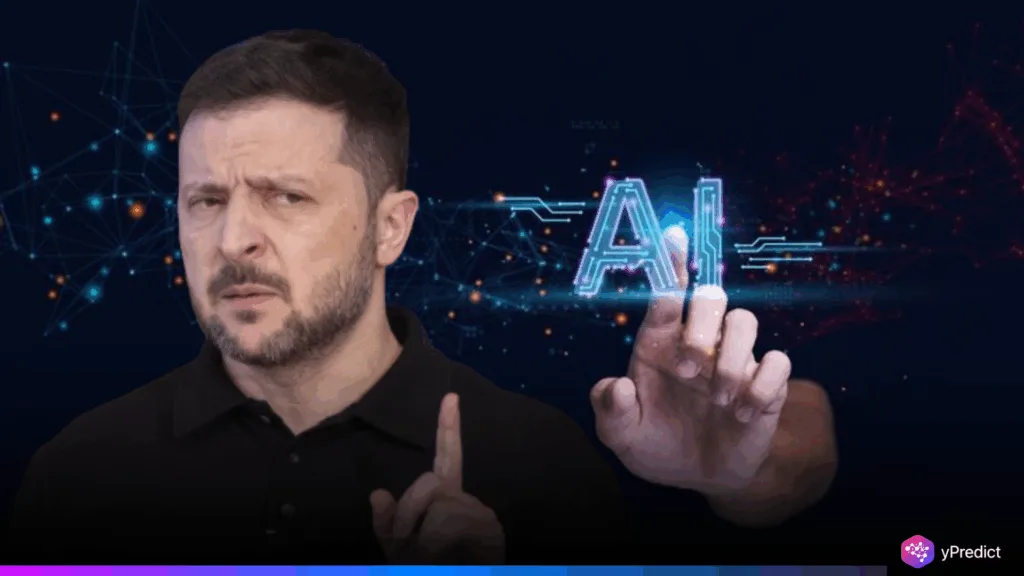
Ukrainian President Volodymyr Zelenskyy urged the international community to impose strict controls on AI technologies with military applications. He warned that Russia’s growing use of AI poses a serious threat to global security and international stability. Zelenskyy urged leaders, policymakers, and tech companies to prevent AI from enabling warfare. He specifically called for action to stop the Kremlin’s armed forces from exploiting advanced AI models for military purposes. His appeal followed intelligence reports revealing Russia’s integration of AI into drones, cyber warfare, and targeting systems.
Zelenskyy Urges Global Sanctions on Military AI Exports to Russia
During the Fair Play Conference in Kyiv, Ukrainian President Zelenskyy urged immediate international action to block AI technology transfers to Russia. He emphasised that Russia is rapidly integrating artificial intelligence into modern weapon systems, increasing the threat to global security. Zelenskyy warned that granting Russia access to advanced AI tools would dangerously escalate military capabilities and destabilise international peace. In a post on the social media platform X, he stated that…
Addressing the Fair Play Conference, I stressed: Russia’s war is critically dependent on its trade with the outside world. We need a new international platform to control dual-use exports and protect ourselves from Russia and its accomplices.
He urged partner states to prioritise artificial intelligence in their export control policies and regulatory frameworks. He called for comprehensive bans on ready-made AI models with military applications to prevent misuse by hostile actors. He also demanded restrictions on services and infrastructure that enable AI development, including cloud platforms and high-performance computing systems. Additionally, he highlighted the need to block access to specialised data sources like commercial satellite imagery used for targeting systems.
Additionally, Zelenskyy also proposed creating a new international mechanism to regulate dual-use technologies and strengthen global security frameworks. He emphasised that such a platform would boost Ukraine’s defence capabilities and limit support from Russia’s key allies, including North Korea and Iran. He called for sector-specific sanctions that are regularly updated to keep pace with fast-changing technological developments and threats.
AI-Enabled Weapons and the Global Supply Chain Behind Russia’s Arsenal
Zelenskyy highlighted that Russia’s weapons production is heavily reliant on imported technologies and components sourced from multiple countries. He stated that the effectiveness of Russian missiles, drones, and battlefield systems depends on how the country trades globally, particularly in energy exports and the acquisition of advanced tools and electronics.
He stated that modern Russian weapons depend heavily on imported components, as Ukraine found hundreds in captured drones and missiles. One Iranian Shahed-136 drone included an Nvidia AI chip, while another with machine vision was shot down in Sumy in June 2025. He added that Russia received machine tools from at least 12 countries this year, with some agreements extending into 2026. He urged an immediate halt to such exports and demanded tougher measures against those supporting Russia’s trade or sanctions evasion.
Financial Networks and Sanctions: Cutting Off Russia’s Lifelines
Zelenskyy stressed that Russia’s war effort is sustained not just by weapons, but by its global financial ties. He pointed to the Kremlin’s dependence on oil revenues and the foreign wealth of its elite, who, despite supporting the war, continue to enjoy luxuries abroad. He urged unwavering international unity to uphold and intensify sanctions for as long as the conflict persists.
He also warned that some Western nations continue, intentionally or through loopholes, to provide components and facilitate Russia’s oil trade, undermining sanctions. He urged allies to close these gaps and coordinate enforcement.
Meanwhile, during a press conference in Minsk, President Vladimir Putin said Russia plans to cut defence spending over the next three years, contrasting it with NATO’s increased military budgets. Despite ongoing internal discussions, he framed the move as de-escalation. Western critics remain doubtful, citing Russia’s rising military outlays and continued aggression. He also acknowledged Donald Trump’s comments on the war’s complexity but showed no real shift toward peace.
Zelenskyy concluded by stressing that sanctions must remain at the heart of international efforts to resist Russia’s war. He called for continued alignment between Ukraine and its allies on all economic and technological restrictions, warning that any easing of pressure would only prolong the conflict and embolden further aggression.






